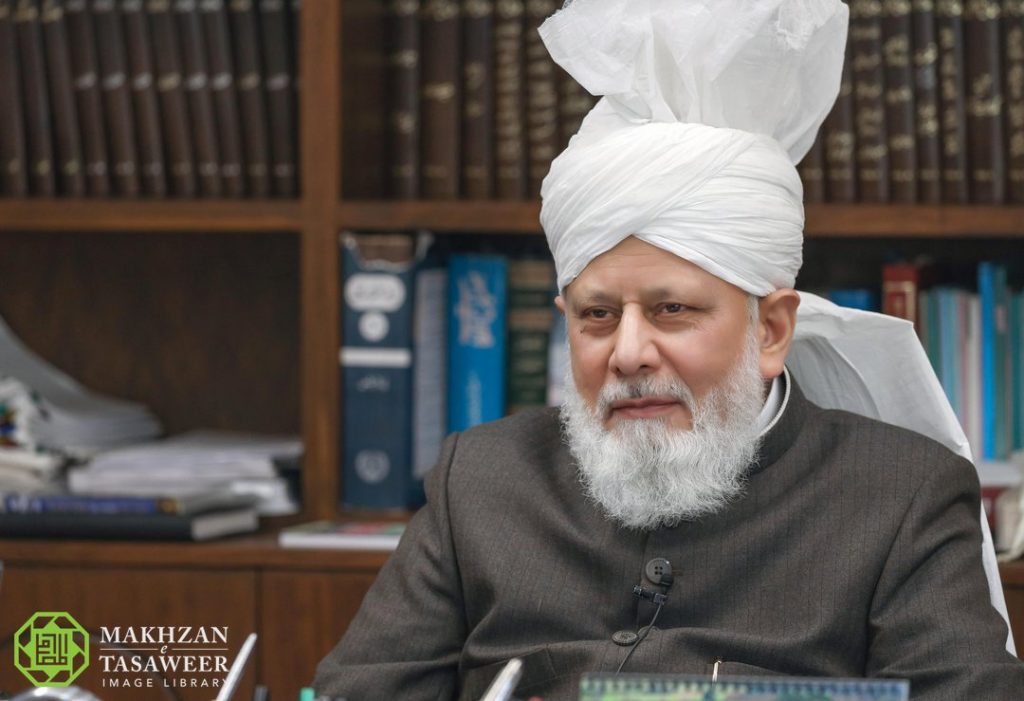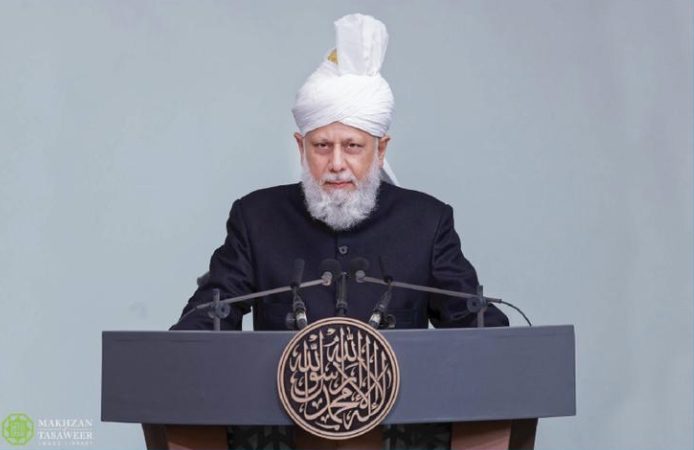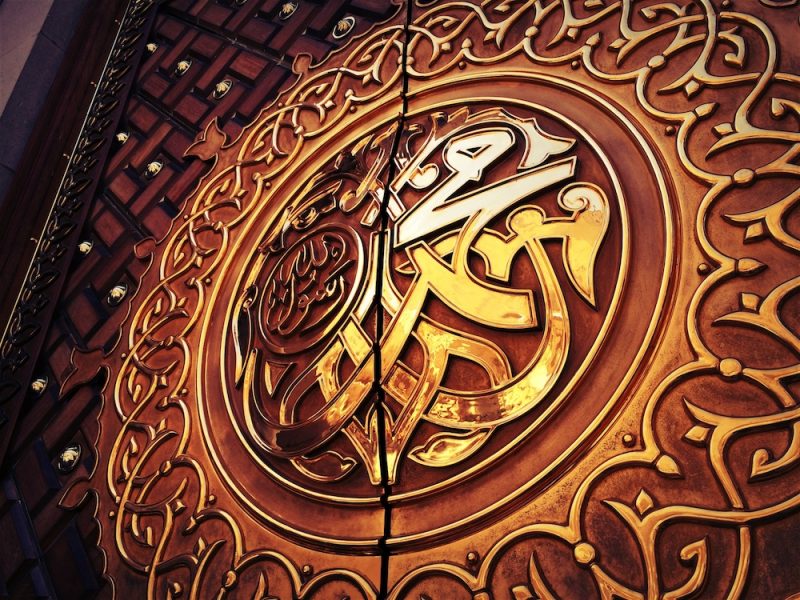
Rays of Wisdom for the Modern World Part 27

His Holiness, Hazrat Mirza Masroor Ahmad (aba) is a beaming beacon of Divine guidance and support. His Holiness (aba) represents the highest level of connection with God in today’s world, and thus he is the spiritual leader for tens of millions across the world, and champions the message of fulfilling the rights owed to God, and fulfilling the duties we each owe to our fellow human beings. Over the course of his Friday Sermons, addresses on various occasions, meetings with different organisations, and children’s classes, His Holiness (aba) imparts invaluable knowledge and insight on a remarkably vast array of topics.
The Review of Religions is honoured to present some of these ‘Rays of Wisdom’ from His Holiness (aba) taken from various sources, for the benefit of its readers.
Contents
What Attracts People to Convert from Christianity to Islam?
Why Did the Ahmadiyya Muslim Community’s Headquarters Move to the UK?
How Does the Caliph Prepare His Friday Sermons?
The Promised Messiah’s (as) Profound Love for the Holy Prophet (sa)
What Attracts People to Convert from Christianity to Islam?

For centuries, Christianity has reigned as the predominant religion in the world, to the extent that the laws and governments of many nations are rooted in the faith. Yet now Islam has become the world’s fastest-growing religion. According to the Pew Research Center, Muslims are projected to grow in number from 1.8 billion in 2015 to 3 billion by 2060, an increase of 70%. In comparison, Christianity is only projected to grow 34% in the same time frame. One major factor in Islam’s growth is that more people are converting to Islam. Someone once asked His Holiness (aba) what it is that attracts Christians in particular to convert to Islam.
His Holiness (aba) replied:
‘All the religions are from God the Almighty. We believe that there were prophets in every nation, in every people since the existence of this world. And God sent His prophets to different nations and according to our beliefs, and it is in the Bible as well that Jesus Christ (as) said, “I have come for the Lost Tribes of Israel”. But the Bible never claimed that it is for the whole universe, and according to our belief, we believe, and it is the claim of the Holy Qur’an, that this is the last book of law of God and the Holy Prophet (sa) was sent for the whole of mankind. It has been mentioned in the Holy Qur’an that the Holy Prophet (sa) has been sent for all of mankind. And this law and this shariah is the last shariah from God Almighty till the end of the days. So this is what we believe: that since all the prophets were from God and all of them prophesied for the coming of the last prophet in the latter days, and according to our belief, that prophet was the founder of Islam, the Holy Prophet Muhammad (sa). And according to our belief, [the] Qur’an is the last book of shariah, the last book of law, and it is the only book which claims that this book of law is for all of mankind until the Day of Judgement. So, this is what we preach. Those who accept, they are welcome. Those who do not, we don’t have any disregard for them in our hearts. [The] Qur’an categorically says that there is no compulsion in religion. Whoever holds whichever religion they want, they can hold [it], despite the fact that now the truth has been manifested from the wrong, the right has been manifested from the wrong. So, this is what we present before the people and those who like our message, they accept [it]; those who do not like [it], even then they are our friends – they are human beings, and we regard human beings.’[1]

The Ahmadiyya Muslim Community was originally established in Qadian, India, which was the home of its founder, Hazrat Mirza Ghulam Ahmad (as). Qadian served as the Community’s headquarters until the partition of India and Pakistan. At that time, under the astute leadership of the Second Caliph, Hazrat Mirza Bashiruddin Mahmud Ahmad (ra), a plot of land was purchased in Pakistan and on 20th September 1948, the foundation stone was laid for a town called Rabwah, which would go on to become the new, active headquarters of the Ahmadiyya Muslim Community. Then, in 1984, during the time of the Fourth Caliph, Hazrat Mirza Tahir Ahmad (rh), the headquarters moved once again, this time to the United Kingdom. A reporter once asked His Holiness (aba) why the Community’s headquarters was moved to the UK.
His Holiness (aba) replied:
‘You see, [the] Pakistani government during Bhutto’s regime enacted a law against Ahmadis, that Ahmadis are not Muslims. But still, we were part of the country. As citizens of Pakistan, we were participating in the political matters and other issues and in the politics of the country and other activities. And despite that law, we were worshipping as we wished, according to our teachings. We were practising and preaching to some extent, whatever we liked according to our belief. But during Zia-ul-Haq’s martial law regime, they further strengthened that; they enacted a law, that was martial law order and then passed by the assembly, that you cannot call your mosques “mosques”; you cannot name your children as Muslims…you cannot pray five times as you wish according to your teachings as Muslims do, and there are so many things which are the teachings of Islam you cannot practise them. So, this is why the then head of the Ahmadiyya Muslim Community had to migrate from Pakistan to the UK, because people do not just sit idle doing nothing; the leader has to lead the community. So, he migrated after this law in 1984 from Pakistan and settled here in London. And after his demise I was elected and then since then we are here. As long as that law prevails the leader of the Ahmadiyya Community cannot go back to Pakistan.’
The reporter asked His Holiness (aba) if he ever dreams of going back to Pakistan. His Holiness (aba) replied:
‘Of course, yes, and we hope that one day we shall.’[2]
How Does the Caliph Prepare His Friday Sermons?

Every Friday, His Holiness (aba) delivers a sermon as part of the Friday prayers. These sermons contain oceans of knowledge and guidance on an array of topics, both secular and spiritual. They are a treasure trove which address not only individual needs but those of the entire world. Once, someone asked His Holiness (aba) how he prepares these sermons, which on average are an hour in length.
His Holiness (aba) replied:
‘When a certain topic comes to mind, I spend around eight to ten hours preparing it. These days I am delivering sermons about the companions [of the Holy Prophet (sa)]; there are various references on different topics which I tell my team to extract, whether they be from the books of the Promised Messiah (sa), Hadith or the Qur’an. When they give those references to me, then I provide more of an explanation. For this series on the companions [of the Holy Prophet (sa)], I have asked the team in Rabwah to find the entire history [of each companion] and provide it to me. When they send it, I read it all, and sometimes I even check the references myself. Then, I deliver the sermon. In any case, it generally takes eight to ten hours to prepare a sermon.’[3]
The Promised Messiah’s (as) Profound Love for the Holy Prophet (sa)

There are many in the world who claim themselves devoted to the Holy Prophet Muhammad (sa), but indeed there are none who were devoted to him like Hazrat Mirza Ghulam Ahmad (as). In fact, he was so devoted to the Holy Prophet (sa) and followed him to such a lofty standard, that it was only due to his complete subordination to his master Muhammad (sa) that he was bestowed the mantle of being the Latter Day Messiah and a Prophet of God. Interestingly, opponents of Ahmadiyyat will suggest that the Promised Messiah (as), God forbid, dishonoured the Holy Prophet (sa). Yet, one glance at his life and the love he had for the Holy Prophet (sa) makes the opposite clear to any fair minded individual.
Whilst speaking about the Promised Messiah’s (as) profound love for the Holy Prophet (sa), His Holiness (aba) once said:
‘…The Promised Messiah (as) received the responsibility of establishing the oneness of God and the revival of Islam because of his complete submission and ardent devotion of the Holy Prophet (sa).
There are countless incidents that express this love and affection. One such incident has been narrated that, “On one occasion the Promised Messiah (as) was strolling on top of Masjid Mubarak on his own. He was humming something while at the same time, tears were falling from his eyes.”
When a person enquired as to why the Promised Messiah (as) was so perturbed, he replied by saying: “I was reading the couplet of Hassan bin Thabit which he wrote at the demise of the Holy Prophet (sa). The couplet was:
كُنْتَ السَّوَادَ لِنَاظِرِيْ
فَعَمِيَ عَلَیْكَ النَّاظِرُ
مَنْ شَاءَ بَعْدَكَ فَلْیَمُتْ
فَعَلَیْكَ كُنْتُ اُحَاذِرُ
“O Muhammad, you were [like] the pupil of my eye which has been blinded since your demise. Whosoever may depart henceforth, for I feared your death alone.”
The Promised Messiah (as) said, “While reading this couplet, I wished in my heart that it was I who had composed this couplet.” The tears flowing down from the Promised Messiah’s (as) eyes illustrated the state of his heart. Those who level allegations against the Promised Messiah (as) that, God forbid, he considered himself superior in rank to the Holy Prophet (sa) cannot even come close to the deep love and affection the Promised Messiah (sa) had expressed for the Holy Prophet (sa).
Hazrat Mirza Bashir Ahmad (ra) has described this emotional state of the Promised Messiah (as) in the following heart-rending manner:
“The Promised Messiah (as) faced all kinds of difficulties and troubles, many a times he had to face a storm of opposition, experienced countless amount of suffering and torment and was [falsely] put on trials for murder. He witnessed the demise of his relatives, close relations, friends and even children and yet never did his close ones ever witness his countenance expressing the state of his heart. However, when it came to the occasion of expressing his love for the Holy Prophet (sa), his eyes flooded with tears.”[4],[5]
ENDNOTES
[1] This Week with Huzoor – Germany July 2019 Tour Special.
[2] This Week with Huzoor – 29th November 2019.
[3] This Week With Huzoor – 3rd January 2020.
[4] Hazrat Mirza Bashir Ahmadra, Seerat-e-Tayyaba, pp. 28-30.
[5] Friday Sermon – 24th May 2017.



